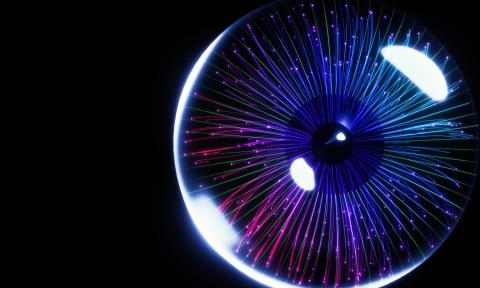
Unveil: better vision for better care
To better see the nanometric particles that transport certain drugs through the human body, the start-up Unveil, a product of the Charles Fabry Laboratory (LCF — Univ. Paris-Saclay/Institut d’Optique Graduate School/French National Centre for Scientific Research, CNRS) has developed an extremely precise optical measuring instrument. The instrument will enable these vectors to be quantified and qualified, and accelerate the development of effective treatments for cancer and autoimmune diseases.
The Unveil adventure began in the Nanophotonics group of the Charles Fabry Laboratory (LCF — Univ. Paris-Saclay/Institut d’Optique Graduate School/French National Centre for Scientific Research, CNRS). That is where Jean-Jacques Greffet was working on near-field microscopy, which allows resolutions better than half a wavelength - considered a general limit. Just over three years ago, he and his team began focusing on developing an optical instrument for use in biology and pharmacy for biomedicines manufactured by living cells. These cells are found in bioreactors and produce active principles. "This is a fast-growing field, accounting for 60% of current research work. It is where we have the best hope of finding solutions for difficult cancers and autoimmune diseases," explains Jean-Jacques Greffet.
"But new diagnostic tools were needed to achieve this," says the researcher, who has since retired. The adventure was only just beginning, as he joined forces with his son, Matthieu Greffet. Since 2018, he has been working at a start-up developing techniques for observing viruses. "The company's technology did not allow us to view particles smaller than 70 nm, although this was in great demand in the market. We discussed it and I suggested an innovative technique to overcome this shortcoming," explains Jean-Jacques Greffet, who filed a declaration of invention with the Charles Fabry Laboratory and drafted a patent, which was approved in September 2023.
Plenty of support for getting started
After these initial steps, the duo set out to find funding. They received support from the PALM Laboratory of Excellence (LabEx) and benefitted from Poc in Labs, a Université Paris-Saclay programme that funds projects entering the pre-incubation phase, and from the French National Centre for Scientific Research (CNRS) pre-incubation programme. "With this support, we were able to fund two PhD candidates and purchase equipment, which allowed us to demonstrate the concept," explains Jean-Jacques Greffet. The father-son duo also received support from the IncubAlliance incubator and the CNRS’ RISE programme to prepare to set up their business. They also received aid from French Tech.
Alexis Auchère, who has industrial, commercial and financial expertise, joined the team of co-founders in early 2024 as future CEO. In November 2024, the start-up was officially founded under the name Unveil, and presided by Matthieu. The company is currently based at the Institut d'Optique Graduate School on the Saclay plateau. It employs four people, plus an intern who will continue their studies with a CIFRE thesis.
Seeing nanoparticles
Unveil developed an instrument that reveals particles ranging from one micrometre to 30 nanometres in just a few minutes. It is used to observe viruses, vesicles and phages, objects used to transport active principles. "For example, RNA in COVID-19 vaccines is highly fragile. To be transported, it is placed in pockets made of lipid nanoparticles. It is important to be able to characterise these vectors as full or empty. Until now, there was no tool capable of answering this question quickly and simply," adds Jean-Jacques Greffet. Current methods are based on averages for all objects.
With Unveil's technology, it is possible to see particles one by one, measure their concentration and diameter and check whether they are full. "Our process is based on mass photometry and, more specifically, on interferometric microscopy to detect even the smallest particles. A laser illuminates nanoparticles suspended in a drop of solution placed on a microscope slide. We then collect the diffused light using a lens. It is like watching dust in a ray of sunshine," says the start-up's co-founder. Software then applies a number of signal processing operations. The holographic technique developed by the company tracks particles individually to measure their trajectory and determine their size and index in just a few minutes.
Market launch in 2027
The technology developed by the start-up is currently at a Technology Readiness Level (TRL) of 7 to 8. The first service sale took place this year. The machine will be installed at the Molecular Science Institute of Orsay (ISMO - Univ. Paris-Saclay/CNRS) to conduct tests on samples and make it available to researchers. The next step will be industrialisation. "A few initial prototypes will be manufactured and installed on platforms or sold to the first customers. Over a year, we will collect feedback and move on to making the final product," explains Jean-Jacques Greffet.
Unveil is currently finalising a fundraising campaign which aims to raise €1 million from different investors and business angels as part of a pre-seed round. It is also awaiting the results of the I-Lab competition. It will use these funds to hire an IT specialist, support staff and application engineers. The business model is to sell the instruments and the consumables that go with them. The start-up has filed a second patent to reorient itself in the market, in a segment where it will have a competitive advantage over its competitors.
Unveil has also just launched a project funded by the French National Research Agency (ANR) in partnership with the Curie Institute. "Its aim is to characterise vesicles, the small pockets that are pieces of membrane. They are produced by cells and play a role in the transmission of information. Researchers use them as vectors to transport genetic material. This is an important issue in the field of biology," concludes the Unveil co-founder.